The capital city of Angola, Luanda, has been brought to a virtual standstill after candongueiro (minibus taxi) drivers launched a three-day strike on Monday, 28th July 2025. The protest was sparked by the government’s recent decision to increase the price of subsidised petrol from 300 to 400 kwanzas per litre, an adjustment that has hit both drivers and commuters hard.
The candongueiros, which are blue and white minibus taxis, transport nearly 90 percent of Luanda’s daily commuters, making them the backbone of public transportation in the city. With their services suspended, movement across Luanda has become extremely difficult, leading to widespread disruption.
By Tuesday evening, police spokesperson Mateus Rodrigues announced that 1,214 people had been arrested in connection with the unrest that followed the strike. He also confirmed that shops, banks, and vehicles were vandalised in various parts of the city, although “pockets of disorder” were still being reported in isolated areas.
According to local activist Laura Macedo, Luanda’s city centre has become eerily quiet, with most businesses closing their doors since Monday afternoon. “Luanda is at a standstill,” she told reporters. “The calm is deceptive. People can see the government is not in the slightest bit concerned about them.”
One of the major complaints from both drivers and passengers is the sharp rise in transport fares. A trip that once cost 700 kwanzas is now being charged at 1,800 kwanzas in some areas, putting extra strain on already struggling households.
Macedo explained that the government allowed taxi drivers to increase prices, hoping it would calm tensions and avoid a major protest. But instead, the price hike has only created more anger among commuters, many of whom cannot afford the new fares. “We don’t have public transport. People are angry and helpless,” she said.
She added that even middle-class families are now finding it hard to survive, pointing to the broader economic struggles faced by ordinary Angolans despite the country’s oil wealth. Angola is Africa’s second-largest oil producer, behind Nigeria, but many citizens feel excluded from the benefits of that resource.
“This is a paradox we’ve lived with since independence,” Macedo said. She criticised President João Lourenço, saying his administration continues to promote events like Angola’s upcoming 50th independence anniversary, while failing to address key issues such as poverty, unemployment, and drought. “How can he be celebrating while children still sleep on the streets and drought continues to kill people in the south?” she asked.
The ANATA taxi drivers’ union, which organised the strike, has distanced itself from the violence and destruction. Its leader, Geraldo Wanga, condemned the looting and stated clearly that union members were not involved in the unrest. He also denounced what he called the “arbitrary arrests” of drivers wrongly accused of inciting violence.
Wanga insisted that the protest was meant to be peaceful, aimed only at pressing the government to reverse or ease the fuel price hike that has severely affected their livelihoods.
The latest unrest is part of a larger wave of public frustration with Angola’s leadership and economic policies. The ruling party, MPLA, has been in power since Angola’s independence from Portugal in 1975, but many now say it is time for a new direction. With inflation rising, jobs scarce, and basic services failing, voices of dissent are growing louder in the oil-rich country.
Angolans, especially in the capital, are demanding urgent reforms and relief from the economic hardship that is pushing more people into poverty, despite the nation’s vast natural resources.
